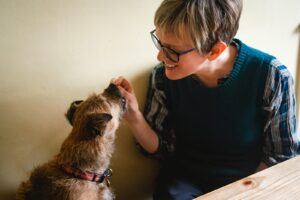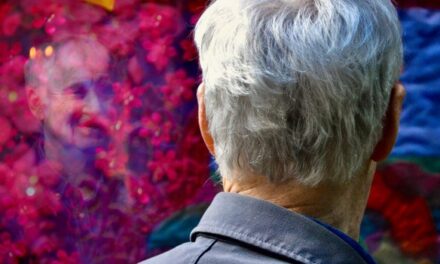Remember the daily walk we were allowed in lockdown one? A precious half hour of fresh air and relative freedom that kept many of us from going completely spare? For Liz Flanagan, an award-winning children’s author and writer of the Wildsmith series, that walk was the inspiration for a series of beautiful books.
“I’ve never loved walking so much,” she says. “I needed that for my mental health.”
A resident of Hebden Bridge in West Yorkshire, Flanagan has the stunning Upper Calder Valley countryside on her doorstep. In her new book, Wildsmith: Into the Dark Forest, Rowan, the main character, escapes to the safety of the woods and animal companionship. At the time of writing, Flanagan was fostering cats and kittens at home and taking daily walks in the woods near her house.
I’ll be honest, that sounds like my idea of heaven – if only we could lose the horrendous pandemic context. I think that’s why the Wildsmith series is so special, because it taps into a nascent desire we all share to sack everything off and go live in the woods. No? Just me? See also: fostering magical animals. I mean, come on, what’s not to love?
When I talk to Flanagan, she is about to appear at the Brontë Festival of Women’s Writing to delve into the theme of Webs of Childhood. As we chat, she acknowledges how lucky she is to live in Yorkshire. The county’s natural world is key throughout Flanagan’s work, from her YA fiction to her middle and lower-grade books. There are obvious parallels with the Brontës and their deep connection with the awe-inspiring landscape that surrounds the Parsonage.

Liz and Tess. Credit Matt Radcliffe.
I ask whether she thinks it’s important for writers to make time and space for nature.
“It’s really, really important. The older I get, the more I recognise that I had years living in a city and I was suppressing that need, until it got stronger and stronger and now it’s like a daily medicine.”
But Flanagan is keen to stress that you don’t need to live in the middle of a national park to have a link with the natural world. Just noticing and nurturing nature wherever it appears – a tree on your walk to school or work, for example – is enough. But fostering a relationship with nature is crucial in order to protect it, says Flanagan.
“That connection is the first step in any kind of activism that might come later. Children are acutely aware of the crisis facing our natural world and it can be a struggle to frame that in a way that isn’t scary. That positive link is the first step.”
Being free to write what you want
I’m interested in whether, as an author who writes for children and leads events in schools, Flanagan feels a weight of responsibility to deliver the right message or impart a particular ‘take’ on society. To be an ‘influencer’, I suppose, but more in the sense of how we treat the world and each other than wearing a White Fox hoodie.
“My books are formed by my politics and my world view, so it’s inevitable that a child reading them will be exposed to that, but I want it to be fun, engaging, exciting or comforting – just a lovely reading experience. If they pick up on my beliefs that’s fine, but I don’t want to preach or hit them over the head with it.”
A library and a librarian in every primary school is a policy she would like to see from the new UK government (hard agree), but when it comes to her readers, the reading experience is paramount, and the writing experience in her workshops is crucial.
“I’ll hold the space and be warm and welcoming but they’re free to write whatever they want. I tell them to write about what they love in the way they speak and I’m not going to tell them what to write.”
 Flanagan loves the fact that the same prompt will result in a completely different piece of writing from every child, because every child is different.
Flanagan loves the fact that the same prompt will result in a completely different piece of writing from every child, because every child is different.
“That’s the wonderful thing about creativity. So my message is, write the story only you can write, because nobody else can write it, and if you don’t, the world doesn’t get it.”
I am all about this message. As an author who has spent years in the submission trenches with not much to show for it, it’s tough to stay motivated. Flanagan and I talk about how hard self-promotion can be when you’re an introvert. But Flanagan has a great way of looking at it, saying that, for an author, marketing is “just telling stories to people who are already interested. I can do that, I don’t have to change. I can just be me and if that connects with people then great, if it doesn’t then they’re not my people, and that’s fine too.”
Team Charlotte, Emily, Anne? Or Branwell…
Finally, I have to ask the question. Does she have a favourite Brontë sibling and a favourite Brontë novel?
It turns out that Flanagan is Team Charlotte. She lights up when we talk about Jane Eyre, at which point I brandish my Jane Eyre mug at the camera with the kind of fervour that only comes with being an unofficial Brontë correspondent. 
A few days after we speak, I hear Flanagan in conversation at the Webs of Childhood Brontë Festival of Women’s Writing, a hybrid festival which offers a fantastic series of events for all ages, from magical story workshops for children to feminist invoicing, yoga and poetry and a guided walk to the Brontë waterfall. Dame Jacqueline Wilson, Lucy Mangan and Clare Wallace of Darley Anderson Literary Agency were just a few names appearing at the festival. Their collective wisdom and wit left me feeling energised and optimistic. Thank you, Brontë Society.
To find out more about The Brontë Society, follow this link: Brontë Parsonage Museum








